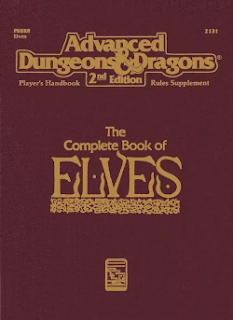Retrospective: The Complete Book of Elves

By the early 1990s, AD&D 2nd Edition was in full swing, and one of its defining features was the proliferation of entries in the Player's Handbook Rules Supplement (PHBR) series, commonly called the Complete books. These were player-focused supplements initially aimed at expanding the options for various classes that were eventually expanded to other topics, including races. The series is mixed bag, with most volumes following in the footsteps of The Complete Fighter’s Handbook – solid and unremarkable. However, a few stand out for how bad they were, The Complete Book of Elves, published in 1993, being my candidate for the worst (feel free to nominate your own in the comments).
Written by Colin McComb, The Complete Book of Elves is, at its core, an expansion of the already-powerful elf race in AD&D. But whereas earlier material presented elves as skilled but balanced adventurers with unique strengths and weaknesses, this book instead leans hard into the idea that elves are just better –smarter, faster, more artistic, more magical, more attuned to nature, and, of course, longer-lived – than virtually every other playable race in the game.
This emphasis is the start of where the book runs into trouble. It doesn’t just provide players with more options for elven characters; it actively reinforces an attitude of elven superiority, sometimes to an absurd degree. Take, for example, this passage:
No elf will ever simply perform a function when he can do it with flair and style. If a human forges a sword, he creates a piece of metal that cuts and slashes. If an elf forges a sword, he creates a masterpiece of balance, beauty, and power.
That's more or less the tone of the entire book. Elves are naturally superior to humans and other races in virtually every way that matters. Their weapons are better, their magic is more refined, their civilization more enlightened, their senses sharper, their emotions deeper. Even their music is better!
If it were merely a matter of tone, The Complete Book of Elves would simply be remembered as insufferable. However, the book follows suit with its rules expansions as well and this, in my opinion, is where it reaches a new level of egregiousness. The new elven kits, which are supposed to offer distinct roleplaying options, tend to be overloaded with benefits and underweighted on drawbacks. The bladesinger, for instance, is a combat-ready spellcaster with virtually no downside beyond its limitation to one weapon. The wilderness runner is an elf so in tune with nature that he can literally run faster than a horse. Even some of the purported elven disadvantages, like the elves' reluctance to use heavy armor, are framed as virtues rather than limitations.
It’s not as if the book is poorly written. McComb has a decent grasp of language and some of the information he presents, particularly concerning elven philosophy and their approach to magic, is interesting. However, it is so unbalanced in its portrayal of elves that it feels almost like a work of in-game propaganda rather than a neutral sourcebook. I don't think that was McComb's intention, but, even if it were, I think he went a bit overboard in his approach. I distinctly recall that, during the '90s, The Complete Book of Elves was the butt of frequent jokes by all but the most dedicated elf fanboys. In my local group, we referred to it as "The Complete Book of Gods," because of its overpowered kits and supercilious prose.
Despite this, The Complete Book of Elves still holds some interest today, if only from a historical perspective. It's an artifact of a time when AD&D was leaning much more heavily into the "story" or "narrative" approach that was pioneered almost a decade earlier in Dragonlance. The book has less concern for mechanical balance than it does for presenting a nonhuman race in sufficient detail for maximum player immersion. I don't think that's necessarily a bad thing – I'm a longtime fan of Roger E. Moore's "Point of View" series in Dragon, for example – but I can't help but feel as the racial Complete books, especially this one, go too far in this direction.
Ultimately, I think The Complete Book of Elves serves as an object lesson in the dangers of overindulging a single race or concept in a game. I prefer it when a supplement expands options, not elevates one choice as obviously better than all the others. Based on my undoubtedly biased experience, this book simply exacerbated an existing problem: players already drawn to elves didn’t need more reasons to see them as superior. It's a flawed and indulgent book, worth a read only if you want a window into some of the worst tendencies of TSR and AD&D during the early to mid-1990s.James Maliszewski's Blog
- James Maliszewski's profile
- 3 followers



